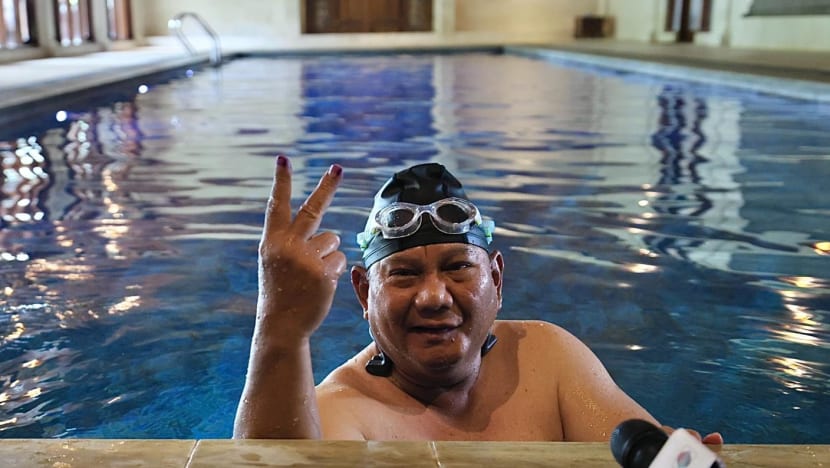Snap Insight: Prabowo looks set to be Jokowi 3.0 after huge lead in Indonesia presidential election
While the official presidential election result is yet to be confirmed, it looks highly likely that the near future of Indonesia will be significantly shaped by the dynamics between Prabowo Subianto and Joko Widodo, says Indonesia analyst Dedi Dinarto.


This audio is generated by an AI tool.
SINGAPORE: Initial results from pollsters’ quick counts indicate that Prabowo Subianto, a former military general and persistent contender in Indonesia’s presidential race, has clinched a decisive victory over his rivals, Anies Baswedan and Ganjar Pranowo.
Exit polls show that Mr Prabowo, alongside his running mate, Gibran Rakabuming Raka, won around 60 per cent of the national vote. If the final results confirm that they won more than 50 per cent of the vote, Mr Prabowo and Mr Gibran will assume office in October this year.
While the official result might not come until next month, the strong likelihood is that we are seeing how the public perceives Prabowo-Gibran as the successor to President Joko Widodo, who has served Indonesia for two terms. But would Mr Prabowo be a worthy successor to Mr Jokowi?
Previous

A woman votes at a polling station during the general election in South Tangerang, on the outskirts of Jakarta, Indonesia on Feb 14, 2024. (Photo: Reuters/Ajeng Dinar Ulfiana)

Presidential candidate Prabowo Subianto swam at his home in Hamabalang, West Java, after casting his vote on Feb 14, 2024. (Photo: Prabowo-Gibran campaign team)

Presidential candidate Anies Baswedan held his final campaign rally in Jakarta (Photo: AFP/BAY ISMOYO)

Presidential candidate Ganjar Pranowo speaking to the media before leaving for a polling centre during the general election in Semarang, Central Java, on Feb 14, 2024. (Photo: Antara Foto/Makna Zaezar via Reuters)

Workers prepare ballot boxes to be distributed to polling stations ahead of the Feb 14 election, in Jakarta, Indonesia. (AP Photo/Tatan Syuflana)

A woman votes at a polling station during the general election in South Tangerang, on the outskirts of Jakarta, Indonesia on Feb 14, 2024. (Photo: Reuters/Ajeng Dinar Ulfiana)

Presidential candidate Prabowo Subianto swam at his home in Hamabalang, West Java, after casting his vote on Feb 14, 2024. (Photo: Prabowo-Gibran campaign team)

Presidential candidate Anies Baswedan held his final campaign rally in Jakarta (Photo: AFP/BAY ISMOYO)

Presidential candidate Ganjar Pranowo speaking to the media before leaving for a polling centre during the general election in Semarang, Central Java, on Feb 14, 2024. (Photo: Antara Foto/Makna Zaezar via Reuters)

Workers prepare ballot boxes to be distributed to polling stations ahead of the Feb 14 election, in Jakarta, Indonesia. (AP Photo/Tatan Syuflana)

A woman votes at a polling station during the general election in South Tangerang, on the outskirts of Jakarta, Indonesia on Feb 14, 2024. (Photo: Reuters/Ajeng Dinar Ulfiana)
Next
- 1
- 2
- 3
- 4
- 5

Mr Jokowi’s influence would persist in a Prabowo administration via his eldest son, Mr Gibran. As the vice president, Mr Gibran’s role would be pivotal in shaping policy decisions, ensuring that Mr Prabowo’s administration remains under Mr Jokowi’s oversight.
Mr Prabowo’s priorities align closely with Mr Jokowi’s emphasis on advancing value-added manufacturing, expanding infrastructure, and developing the new capital, Nusantara. However, certain campaign promises, such as a free school lunch programme, should be taken with a grain of salt because they are unlikely to be financially viable and would potentially strain the state budget.
Under Mr Prabowo, Indonesia would continue to court foreign investment to foster economic growth. Mr Prabowo is likely to strengthen trade and investment ties with China, building on the groundwork laid by Mr Jokowi over the past decade.
However, closer economic cooperation with China will not come at the expense of weakened ties with other countries. Like his predecessors, Mr Prabowo would not compromise Indonesia’s foreign policy principle of non-alignment. He would continue to engage with all countries, as long as there are political and economic benefits coming from the cooperation.






